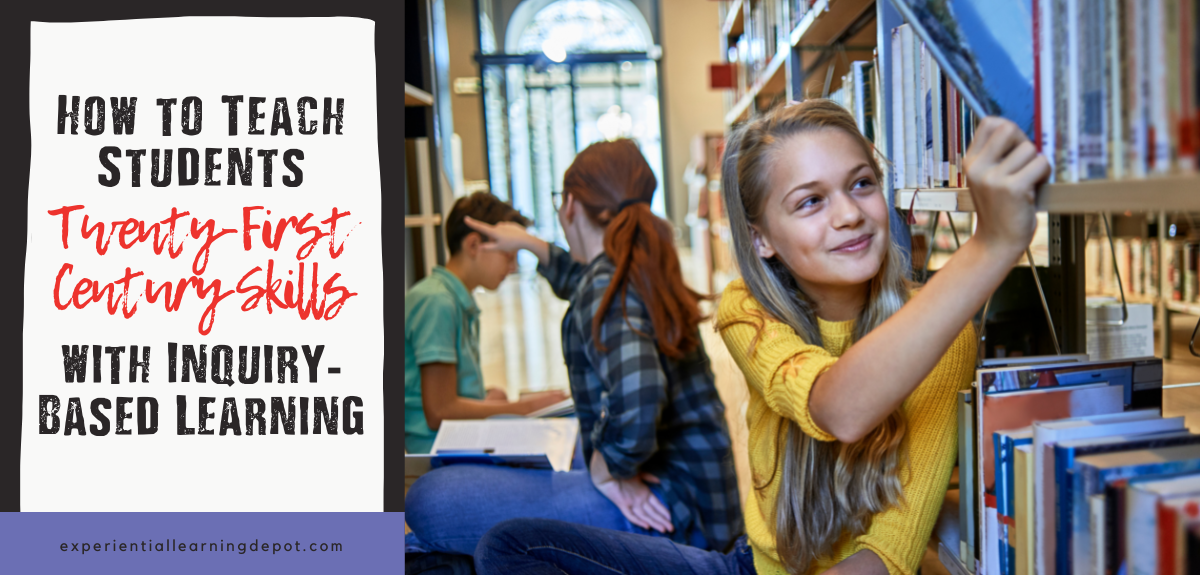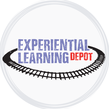|
Experiential learning resources for the innovative educator
Creating opportunities in the classroom for students to build 21st-century skills should be a priority for today's educators. ALL of them. How do you infuse 21st-century skills seamlessly into the curriculum or learning day? I like to promote 21st-century skill-building with inquiry-based learning strategies. I went through my teaching licensure program in 2007. At that time, the main objective was to train us to be leaders in inquiry-based learning. I never questioned why inquiry was so heavily emphasized, I just did what I was told (ironically). Inquiry-based learning allows learners to construct an understanding of the content or concepts through observation, questioning, exploration, experimentation, and so on. The main objective is to spark curiosity so that students want to know more. There are many ways to implement inquiry-based learning strategies into your curriculum or learning day. After 14 years in education, I now understand why my professors were so insistent on teaching us an inquiry approach. I knew the what and the how; what inquiry was and how to facilitate inquiry learning experiences. But I didn't know why, and I didn't ask. But the "why" is equally as important. If you don't know why you're doing something, why would you do it at all? I trusted that my professors had a great reason for harping on inquiry, and I'm glad I did, because the "why" is powerful, especially when it comes to teaching 21st-century learners. Inquiry-based learning strategies offer so much more than content development. Inquiry creates opportunities for building skills that are critical for thriving in this fast-paced, technology-heavy, information-inundated society that we live in. This picture that I've painted is the now and it is the future for our students. So the "why" behind inquiry-based learning strategies for me lies heavily in the skills that come out of doing it. Inquiry-based learning strategies help students build a hefty portfolio of skills, but I'm going to go over a few of my favorites in this post. Five 21st-Century Skills Developed from Inquiry-Based Learning Strategies1. Resourcefulness Inquiry-based learning strategies encourage resourcefulness. The process of learning through inquiry requires students to gather information on their own rather than receive information through direct instruction. Some inquiry experiences, such as self-directed project-based learning, ask students to explore topics and investigate questions by reaching out to community experts and organizing authentic learning activities. Collaborating with the community and utilizing community resources is one such way to practice resourcefulness. 2. Independence and Self-Direction: Independent productivity and the ability to manage and direct one's own learning experiences are absolutely skills that cannot be acquired through direct, teacher-led instruction. For students to be self-sufficient and self-directed, they need to be able to make their own choices as part of the learning process. Inquiry-based learning sets the stage for self-direction. Students can choose their questions and determine how they will gather information. This is especially true with self-directed project-based learning, which allows students to practice self-direction through sustained inquiry. In self-directed project-based learning, students design, manage, and direct their own PBLs. Students write the driving questions, they ask and research questions that they believe will help them answer the driving question, they gather their own information using their choice of community experts, produce a final product of their choice, and choose an authentic presentation and audience. It is also true with scientific open-inquiry investigations where students make observations, ask their own questions, and design experiments around those questions. 3. Critical Thinking: This 21st-century skill, critical thinking, comes up often. Critical thinking is arguably the most important 21st-century skill because it applies to so many facets of life. Inquiry-based learning strategies are an effective way to advance critical thinking skills. Problem-based learning, scientific experimentation, STEM, and project-based learning all pave the way to questioning. They encourage students to challenge what they think they know. Students objectively evaluate their experiences, observational phenomena, and real-world issues. 4. Creativity: I often hear people say that they're not creative, they weren't born that way, or they're not the creative one in the family. This just isn't true. Creativity is a skill that can be developed with practice and opportunity. Inquiry-based learning is that opportunity. STEM and maker education are two great learning experiences that promote creativity. For example, one of my STEM challenges is for students to develop a plant prototype that can successfully "cross-pollinate" with "wind". Students design and build their own prototypes, try them out, fail, make creative adjustments, and try again. There would be little opportunity for creative thinking if I had given a PowerPoint presentation on wind pollinator adaptations instead of facilitating this STEM activity. Inquiry-based learning strategies offer learners the chance to find their way through self-directed inquiry and creative problem-solving. 5. Problem-Solving: There are so many great learning experiences that promote problem-solving, problem-based learning being the most obvious. With problem-based learning (PrBL) experiences, students heavily investigate and assess one issue, question people on a spectrum of perspectives related to the issue, and figure out the most effective way(s) to solve the problem. STEM and design thinking are also great inquiry activities that utilize problem-solving skills. Students investigate the concepts and put those concepts into practice. If something doesn't work as they thought, they ask how the problem can be solved and in what diversity of ways. Before I go, check out this simple inquiry activity in the video below. The video shows a mixture of cornstarch and water. When handled, it feels like a liquid at times and a solid at times. It is a non-Newtonian fluid. A Newtonian fluid is one described as having the properties of an ideal liquid. A cornstarch and water mixture is not that! This challenges our observations and experiences around states of matter, inspiring questioning and the desire to explore the concept! This video along with the guiding questions is an example of an inquiry activity that offers the opportunity to practice resourcefulness, self-direction, critical thinking, creativity, and problem-solving, among others. Try it out and use it as inspiration for your own inquiry-based learning activities! 1. What do you observe? 2. What does this video make you wonder? 3. What do you believe the mixture is made of? 4. Does the content of this video remind you of something else or an experience that you have had in the past? 5. Do you think the material is a liquid, solid, both, neither, something else entirely? 6. If you aren't sure, how could you find out? There are so many more skills that can be refined by doing inquiry-based learning. I encourage you to check out my 21st-century skills portfolio resource (printable and digital options) where students can compile evidence of skill-building and showcase their achievements. Inquiry-based learning strategies that incorporate these opportunities for learning could be that evidence! Helpful Inquiry and Skill-Building Tool Kits: Let's work together! Click the links below to learn more: Related Blog Posts: Join our Experiential Education Facebook Group!
Did you know there is an experiential learning Facebook group? Check that out - Experiential Learning Community for K12 Teachers - and join in the discussion about experiential learning ideas such as real world learning in the classroom. Let's Get Social! Follow Experiential Learning Depot on Pinterest, Facebook, Youtube, and Instagram for more on experiential education. Observe. Question. Explore. Share.
4 Comments
Sara (Experiential Learning Depot)
12/3/2021 08:46:47 am
Thank you, Michelle! And thanks for reading!
Reply
Sara (Experiential Learning Depot)
12/29/2021 11:09:50 am
Thank you, Michael! And thank you for reading. I agree that this is an important topic!
Reply
Your comment will be posted after it is approved.
Leave a Reply. |
Blog IntentTo provide innovative educational resources for educators, parents, and students, that go beyond lecture and worksheets. AuthorSara Segar, experiential life-science educator and advisor, curriculum writer, and mother of two. Categories
All
|













 RSS Feed
RSS Feed